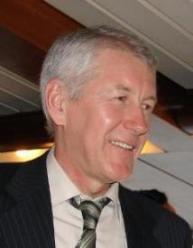Plenary Speech
Optimal and Robust State Estimation: Batch and Recursive Approaches

Professor Yuriy S. Shmaliy,
Ph.D, Dr.Sc, IEEE Fellow, AAIA Fellow
Department of Electronics Engineering,
Universidad de Guanajuato,
DICIS, Salamanca, 36885, Mexico
E-mail: [email protected]
Abstract:
Optimality and robustness often go along with the requirement of accuracy and precision in state estimation, especially under harsh operation conditions. If the system dynamics is represented in state space by a linear stochastic differential equation with exactly known white Gaussian or Gauss-Markov noise and initial values, then optimal Kalman filtering is the best choice. Otherwise, performance may severely degrade due to mismodeling, temporary uncertainties, bad initial values, and errors in the noise statistics – we often see this in practice. Better robustness is inherent to convolution-based batch state estimators with finite impulse response (FIR) due to several features such as bounded input bounded output stability. In this talk we discuss the trade-off in optimality and robustness between the recursive (Kalman-like) schemes and batch state estimators such as optimal (OFIR), optimal unbiased (maximum likelihood), unbiased (UFIR), and several robust algorithms such as having the H2, H∞, peak-to-peak, and energy-to-peak nominal performances. We show that the UFIR state estimator, which completely ignores zero mean noise and initial conditions, is the most robust among other linear state estimators. Other algorithms are intermediate between optimal (not robust) Kalman and OFIR state estimators and the robust UFIR (not optimal) state estimator. The important thing is that on the given optimal horizons, the UFIR filter becomes a blind state estimator – this property is highly required in engineering. Practical examples are taken from tracking, robotics, navigation, signal processing, control, and medical applications.
Brief Biography of the Speaker: Yuriy S. Shmaliy, IEEE Fellow, AAIA Fellow, received the B.S., M.S., and Ph.D. degrees in electrical engineering from Kharkiv Aviation Institute, Kharkiv, Ukraine, in 1974, 1976, and 1982, respectively, and the Dr.Sc. degree in electrical engineering from USSR Government, in 1992. Since 1986, he has been a Full Professor. From 1985 to 1999, he was with Kharkiv Military University, Kharkiv, Ukraine. In 1992, he founded the Scientific Center Sichron and was the Director in 2002. Since 1999, he has been with the Universidad de Guanajuato, Guanajuato, Mexico, and from 2012 to 2015, he headed the Department of Electronics Engineering in this University. He has 519 journal and conference papers and holds 81 patents. He has authored the books Continuous-Time Signals (Springer, 2006), Continuous-Time Systems (Springer, 2007), GPS-Based Optimal FIR Filtering of Clock Models (Nova Science Publ., 2009), and Optimal and Robust State Estimation: Finite Impulse response (FIR) and Kalman Approaches (Wiley & Sons, 2022). He also edited the book Probability: Interpretation, Theory and Applications (Nova Science Publ., 2012). His current interests include robust state estimation, statistical signal processing, and stochastic system theory. His discrete orthogonal polynomials are called discrete Shmaliy moments. He was rewarded a title, Honorary Radio Engineer of the USSR, in 1991, was with the Ukrainian State Award Committee on Science and Technology, in 1998-1999, and has been IEEE Fellow Committee Member, in 2023-2024. He was the recipient of the Royal Academy of Engineering Newton Research Collaboration Program Award, in 2015, IEEE Latin America Eminent Engineer Award, in 2021, and several best conference paper awards. He was invited many times to give tutorials, seminars, keynote lectures, and plenary lectures.
